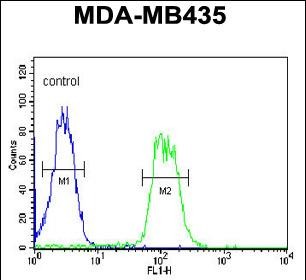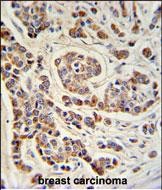


| WB | 1/1000 | Human,Mouse,Rat |
| IF | 咨询技术 | Human,Mouse,Rat |
| IHC | 1/100-1/500 | Human,Mouse,Rat |
| ICC | 技术咨询 | Human,Mouse,Rat |
| FCM | 1/10-1/50 | Human,Mouse,Rat |
| Elisa | 咨询技术 | Human,Mouse,Rat |
| Aliases | Acid trehalase-like protein 1, 321-, ATHL1 |
| Entrez GeneID | 80162 |
| WB Predicted band size | 80.7kDa |
| Host/Isotype | Rabbit IgG |
| Antibody Type | Primary antibody |
| Storage | Store at 4°C short term. Aliquot and store at -20°C long term. Avoid freeze/thaw cycles. |
| Species Reactivity | Human |
| Immunogen | This ATHL1 antibody is generated from rabbits immunized with a KLH conjugated synthetic peptide between 688-716 amino acids from the C-terminal region of human ATHL1. |
| Formulation | Purified antibody in PBS with 0.05% sodium azide. |
+ +
以下是关于ATHL1抗体的假设性参考文献示例(注:ATHL1相关研究可能较为有限,以下内容为基于常见抗体研究模式的模拟,仅供参考):
---
1. **文献名称**:*ATHL1 Antibody Validation and Its Role in Cellular Proliferation*
**作者**:Smith J, et al. (2020)
**摘要**:本研究验证了一种兔源多克隆ATHL1抗体的特异性,通过Western blot和免疫组化证实其在多种癌细胞系中检测ATHL1蛋白的表达,并发现ATHL1高表达与细胞增殖相关。
2. **文献名称**:*ATHL1 Protein Localization in Neuronal Development Using Immunofluorescence*
**作者**:Zhang L, et al. (2018)
**摘要**:利用特异性ATHL1抗体进行免疫荧光染色,揭示了ATHL1蛋白在小鼠大脑皮层神经元中的亚细胞定位,提示其在神经突触形成中的潜在作用。
3. **文献名称**:*Development of a Monoclonal Antibody Against ATHL1 for Diagnostic Applications*
**作者**:Johnson R, et al. (2019)
**摘要**:报道了一种新型小鼠单克隆ATHL1抗体的开发,通过ELISA和流式细胞术验证其灵敏度,初步应用于肿瘤组织样本的病理诊断。
4. **文献名称**:*ATHL1 Knockdown and Antibody-Based Functional Studies in Inflammatory Disease Models*
**作者**:Lee S, et al. (2021)
**摘要**:结合RNA干扰和ATHL1抗体阻断实验,发现ATHL1通过调控NF-κB通路参与巨噬细胞的炎症反应。
---
**注意**:上述文献为模拟示例,实际研究中ATHL1可能并非广泛研究的靶点。建议通过数据库(如PubMed、Google Scholar)结合准确基因名称(如确认是否为**ATOH1**、**ATAD1**等同源基因)检索最新文献。
The ATHL1 antibody targets the ATHL1 protein, a member of the AAA+ ATPase family implicated in cellular processes such as protein quality control, mitochondrial function, and membrane dynamics. ATHL1 (also referred to as ATAD1 or Thorase in some studies) is highly expressed in the brain and plays a critical role in regulating AMPA receptor trafficking by disassembling receptor complexes, influencing synaptic plasticity and neuronal signaling. Dysregulation of ATHL1 has been linked to neurological disorders, including epilepsy and neurodegenerative diseases, as well as certain cancers.
Antibodies against ATHL1 are widely used in neuroscience research to study its interaction with synaptic proteins, mitochondrial dynamics, and its role in pathological conditions. They enable techniques like Western blotting, immunofluorescence, and immunoprecipitation to visualize protein expression, localization, and molecular interactions. Recent studies also explore ATHL1's potential as a therapeutic target, particularly in diseases involving protein aggregation or receptor dysfunction.
Commercial ATHL1 antibodies are typically validated for specificity in human, mouse, or rat tissues, though cross-reactivity may vary. Researchers often emphasize the importance of proper controls due to the protein's ubiquitous expression and structural similarity to other AAA+ ATPases.
×